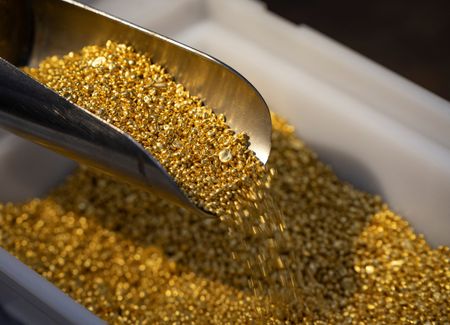By Seher Dareen
(Reuters) – Gold prices held steady after Wednesday’s release of the minutes of the Federal Reserve meeting in March, as the metal’s appeal as a safe haven and inflation hedge offset an expected 50 basis point rate hike by the U.S. central bank.
Spot gold XAU= was little changed at $1,923.50 per ounce by 3:08 p.m. ET (1908 GMT) and U.S. gold futures GCv1 settled down 0.2% at $1,923.10.
“You’ll see gold trade a little lower between now and the close today, but there was really no big surprise in those (Fed) minutes,” said RJO Futures senior market strategist Bob Haberkorn, adding that the downside to gold was limited.
“The markets were expecting that half a point hike.”
Fed officials noted that one or more 50 bps increases in the target range could be appropriate at future meetings, the next one being in May, particularly if inflation pressures remained elevated or intensified, according to the March 15-16 policy meeting minutes. (Full Story)
The Fed raised rates by 25 bps after their March meeting, and the minutes showed that the economic effects of Russia’s invasion of Ukraine late in February prevented a 50-bps hike.
Rising U.S. interest rates and higher yields increase the opportunity cost of holding bullion, which is also used as a hedge against rising inflation.
Gold prices could, however, continue rising for the next two quarters, as the Fed would be unable to raise rates quick enough to combat the high inflation, Haberkorn added.
The dollar surged to a nearly two-year highs while, dimming gold’s appeal. USD/
“There’s still a number of things that could trigger another rally in gold. Inflation continuing to rise beyond current expectations, Ukraine/Russia talks collapsing or a recession,” said Craig Erlam, senior market analyst at OANDA.
Among other precious metals, silver XAG= rose 0.4% to $24.40 per ounce, platinum XPT= fell 1.5% to $953.88, and palladium XPD= fell 2.2% to $2,189.43.
(Reporting by Seher Dareen and Eileen Soreng in Bengaluru; Editing by Shailesh Kuber, Alexandra Hudson and Richard Chang)











